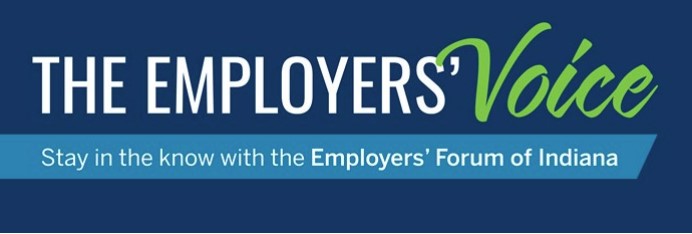
Welcome from the CEO
Welcome to this month’s issue of The Employers’ Voice, an e-newsletter for Employers’ Forum of Indiana members and participants.
Over the past few months I have been busy meeting with many state and national organizations presenting and discussing the RAND study findings. Bottom line, employers want to pay for high quality, affordable services. The RAND 2.0 study shows us that we have a clear price problem, as Indiana was noted to have the highest hospital prices out of the 25 states analyzed. We need to collectively figure out a better path forward.
In this issue we’ll share an update on RAND 2.0, highlight national efforts towards price transparency, share the latest news and publications, and more. In the future, we invite you to share relevant resources, tools, and information. We welcome your feedback and contributions, and hope this will become a valuable resource that you find beneficial.
Thank you, and I look forward to seeing you all at the July 31 Stakeholder Meeting!
Gloria Sachdev
President and CEO, Employers’ Forum of Indiana
RAND 2.0 Study Results Now Available

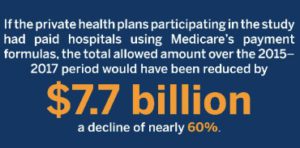
The results of RAND 1.0 showed that on average, Indiana employers were paying hospitals 272% of what Medicare pays. To see how Indiana employers compared to other states in this regard, we expanded the transparency study to include data from employers in 25 states across the US (RAND 2.0). Key findings of RAND 2.0 include:
- Relative prices for the 1,600 hospitals across 25 states analyzed rose from 236% of Medicare rates in 2015 to 241% of Medicare rates in 2017
- Indiana was found to have the highest hospital relative prices among the 25 states analyzed, with prices increasing from a mean of 294% in 2015 to 311% in 2017
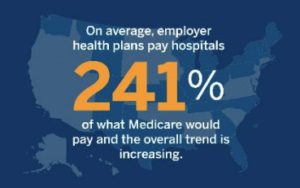
Visit the Employer Price Transparency Project website at employerptp.org for:
- RAND 2.0 Report
- Rand 2.0 Supplement Database
- RAND 2.0 Interactive Map Tool
- Latest News
- Sign up for RAND 3.0
- FAQ for RAND 3.0
- And More!
National Price Transparency Efforts
President Trump’s Executive Order on Improving Price and Quality Transparency in American Healthcare to Put Patients First
On June 24, 2019, President Trump issued an executive order which seeks to increase price transparency and lower health care costs for consumers in America. The order requires federal agencies to propose regulations that would require hospitals and providers within hospitals to disclose actual prices to patients ahead of time.
Lower Health Care Costs Act of 2019
In June the U.S. Senate Health, Education, Labor, and Pensions Committee approved legislation to end surprise billing and to take steps to reduce the out-of-pocket costs for healthcare in the United States. The Lower Health Care Costs Act aims to increase transparency in healthcare costs for employers and consumers, and to lower to the cost of generic drugs by increasing prescription drug competition.
Hospital Competition Act of 2019
In January, Congressman Jim Banks (R-IN) introduced the Hospital Competition Act of 2019. This bill aims to reduce what Americans spend on hospital services by lowering costs through expanding competition in the hospital sector and requiring certain hospitals to accept Medicare reimbursement rates from commercial payers.
Employer-Legislative Roundtable on June 4, 2019
State legislators invited the Forum to present RAND 2.0 study findings at a roundtable event last month. This roundtable included a panel discussion of employers sharing how high hospital prices in Indiana are impacting their businesses and employees. Policy initiatives which remove barriers for and improve the competitiveness of our market are likely to result in improved patient outcomes and spending moderation.
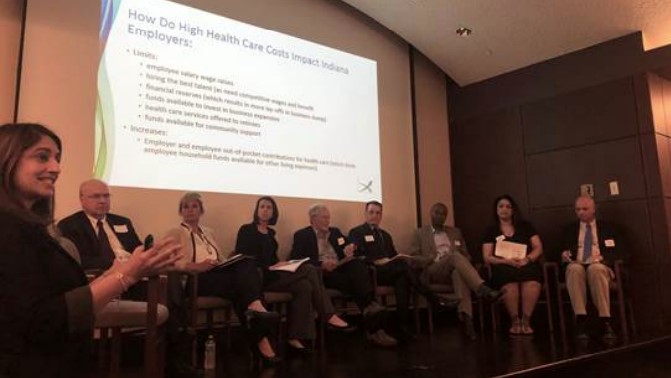
Tobacco Cessation Opportunities Increase for Hoosiers
Indiana Tobacco Cessation Order
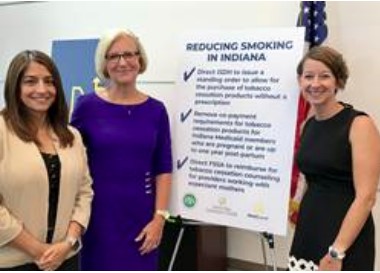
Dr. Sachdev worked closely with Indiana State Representative Steve Davisson to create legislation which provides authority to the Indiana State Health Commissioner to issue protocols for pharmacists to provide all CDC-approved immunizations and FDA-approved tobacco cessation medications. Since this bill passed into law in 2017, she has been part of a small team developing these protocols for Dr. Kris Box, Indiana State Health Commissioner. With the work completed, Dr. Box signed a comprehensive tobacco cessation standing order on July 15, 2019.
This order will help Hoosiers who wish to quit smoking be successful by:
- Allowing for the purchase of tobacco cessation products without a prescription;
- Removing copay requirements for tobacco cessation requirements for Indiana Medicaid members who are pregnant or are up to one year post-partum; and
- Directing FSSA to reimburse for tobacco cessation counseling for providers working with expectant mothers.
Tobacco Addiction Prevention Across the U.S.
Indisputably, smoking is the number one cause of preventable death. It has been shown that increasing the inimum age for purchasing smoking products from 18 years old to 21 years old makes a difference. Learn what states across the U.S. are doing to raise the legal minimum sales age to 21 and prevent tobacco addiction at Tobacco 21.
Tobacco to 21 Act
Our own U.S. Senator Todd Young (R-IN) has introduced a federal bill on this important topic called the Tobacco to 21 Act. This act would raise the minimum legal age to purchase tobacco from 18 to 21. This one is a no brainer that all of us can get behind!
In the News
Modern Healthcare Metrics Database
New Modern Healthcare database which notes hospital financials including profit margins, quality rankings, bed capacity, and more for all hospitals in US in freely and publicly available. Interestingly, Indiana’s average hospital bed capacity rate is 60%, meaning 40% empty beds. Search any hospital by hospital name.
PwC Behind the Numbers 2020 (PDF)
This report notes that the medical cost trend was 5.7% the past two years and is projected to increase to 6% 2020. The graphs are terrific and include drug spend trends, chronic disease/mental health costs, and more.
Resolving Surprise Medical Bills (Health Affairs Blog)
This article notes that that the best legislative option to address surprise billing is to establish an out-ofnetwork cap that is based on a percent of Medicare, not based on arbitration or market value prices.
Sound, Fury, and Prescription Drugs (The New York Times)
Prescription drug prices rose four times faster than inflation in the past six months alone. Ideas include basing drug prices on value drug providers, and negotiating with drug makers directly.
The absurdly high cost of insulin, explained (Vox)
Colorado just became the first state to cap the price of insulin at $100 per month beginning Jan 2020.
PBMs’ spread pricing inflates healthcare spending, commission finds
(Modern Healthcare)
PBM charging payers more than paying the pharmacy equals spread pricing and is a huge problem.
Do you have a suggestion or contribution for our next newsletter? Contact us.

